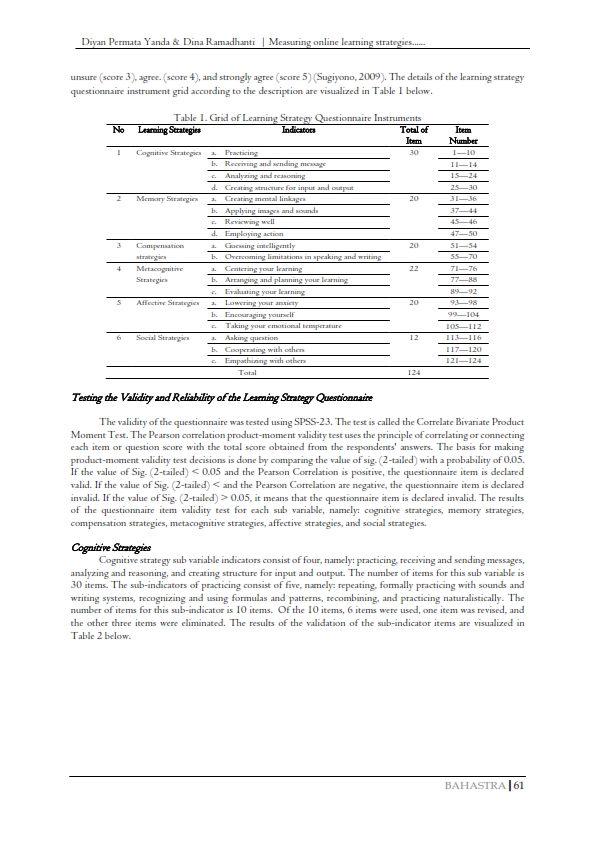Measuring Online Learning Strategies During The Covid-19 Pandemic: Instrument Validity and Reliability
DOI:
https://doi.org/10.26555/bs.v42i1.69Keywords:
measuring, learning strategies, validity, reliabilityAbstract
This study aims to describe the validity and reliability of the learning strategy questionnaire instrument used during the Covid-19 pandemic. By using a quantitative approach, measurement of the learning strategy questionnaire was developed based on six language learning strategies, namely: cognitive strategies, memory strategies, compensation strategies, metacognitive strategies, affective strategies, and social strategies. A total of 17 students were randomly selected to be the test subjects of the learning strategy instrument. By using SPSS 23, the bivariate product moment correlate test was used to determine the validity of the questionnaire items and Cronbach's Alpha test to determine the reliability of the questionnaire. The results showed that as many as 124 questionnaire items were tested on respondents, it was found that 92 questionnaire items were declared valid and overall the questionnaire items were declared reliable or consistent. Thus, as many as 92 items of this learning strategy questionnaire statement can be used to measure the types of language learning strategies used by students, both for online learning and face-to-face learning.
References
Agung Setiabudi, Mulyadi, & H. P. (2019). An Analysis of Validity and Reliability of A Teacher-Made Test (Case Study at XI Grade of SMA N 6 Bengkulu). Journal of English Education and Teaching )JEET), 3(4), 522–532.
Amirono, & Daryanto. (2016). Evaluasi & Penilaian Pembelajaran Kurikulum 2013. Yogyakarta: Gava Media.
Han, J. W., Park, J., & Lee, H. (2021). Validity and Reliability of The Korean Version of The Fear of Covid-19 Scale. International Journal of Environmental Research and Public Health, 18(14). https://doi.org/10.3390/ijerph18147402
Helda, T., & Ramadhanti, D. (2019). Analisis Dan Validasi Perangkat Pembelajaran Sintaksis Berbasis Problem Based Learning (Pbl) (Analysis and Validation of Syntax Learning Tool Based Onproblem Based Learning). Metalingua: Jurnal Penelitian Bahasa, 16(2), 285. https://doi.org/10.26499/metalingua.v16i2.212
Kulsum, K., & Suryadi, T. (2021). Validity And Reliability Test For Research Instruments Regarding Health Professional Student Satisfaction Towards Online Learning During The Covid-19 Pandemic. European Journal of Molecular & Clinical …, 07(10), 2802–2817. Retrieved from https://ejmcm.com/article_7037.html
Mikaberidze, A. (2007). A Brief Review of the Types of Validity and Reliability of scales in Medical Research. International Journal of Phytoremediation, 20(1), 135–136. https://doi.org/10.1080/13518040701205365
Moses, R. N., & Yamat, H. (2021). Testing the Validity and Reliability of a Writing Skill Assessment. International Journal of Academic Research in Business and Social Sciences, 11(4), 202–208. https://doi.org/10.6007/ijarbss/v11-i4/9028
Oktavia, R., Irwandi, I., Rajibussalim, T., Mentari, M., & Mulia, I. S. (2018). Assessing the Validity and Reliability of Questionnaires on The Implementation of Indonesian Curriculum K-13 in STEM Education. Journal of Physics: Conference Series, 1088, 0–7. https://doi.org/10.1088/1742-6596/1088/1/012014
Oxford, R. L. (1990). Language Learning Strategies: What Every Teacher Should Know. Boston: Heinle.
Purwanto. (2011). Evaluasi Hasil Belajar. Yogyakarta: Pustaka Pelajar.
Ramadhanti, D., & Basri, I. (2014). Pengembangan Modul Pembelajaran Menulis Cerpen Berbasis Contextual Teaching and Learning (CTL) Siswa Kelas IX SMP Negeri 2 Lembah Gumanti Kabupaten Solok. Jurnal Bahasa, Sastra, Dan Pembelajaran, 2(3), 45–57. https://doi.org/10.24036/bsp5019999
Riduwan. (2007). Skala Pengukuran Variabel-Variabel Penelitian. Bandung: Alfabeta.
Safi’i, I., & Salamah, I. (2021). Measuring The Conformity Level of The Evaluation Instruments In The BSE for Indonesian Language Subject with The 2013 Curriculum. Bahastra, 41(1), 38. https://doi.org/10.26555/bahastra.v41i1.18433
Sari, W. A., & Nurgiyantoro, B. (2020). Validasi Bahan Ajar Menulis Teks Nonfiksi Berbasis Pendekatan Genre. Bahastra, 40(1), 60. https://doi.org/10.26555/bahastra.v40i1.15754
Sugiyono. (2009). Metode Penelitian Pendidikan: Pendekatan Kuantitatif, Kualitatif, dan R&D. Bandung: Alfabeta.
Sürücü, L., & Maslakçı, A. (2020). Validity and Reliability in Quantitative Research. Business & Management Studies: An International Journal, 8(3), 2694–2726.
Taber, K. S. (2018). The Use of Cronbach’s Alpha When Developing and Reporting Research Instruments in Science Education. Research in Science Education, 48(6), 1273–1296. https://doi.org/10.1007/s11165-016-9602-2
Ursachi, G., Horodnic, I. A., & Zait, A. (2015). How Reliable are Measurement Scales? External Factors with Indirect Influence on Reliability Estimators. Procedia Economics and Finance, 20(15), 679–686. https://doi.org/10.1016/s2212-5671(15)00123-9
Wenno, I. H., Tuhurima, D., & Manoppo, Y. (2021). How To Create A Good Test. Jurnal Pendidikan Profesi Guru Indonesia (Jppgi), 1(1), 11–20. https://doi.org/10.30598/jppgivol1issue1page11-20

Downloads
Published
Issue
Section
License
Copyright (c) 2022 Diyan Permata Yanda, Dina Ramadhanti

This work is licensed under a Creative Commons Attribution-ShareAlike 4.0 International License.

1.jpg)






